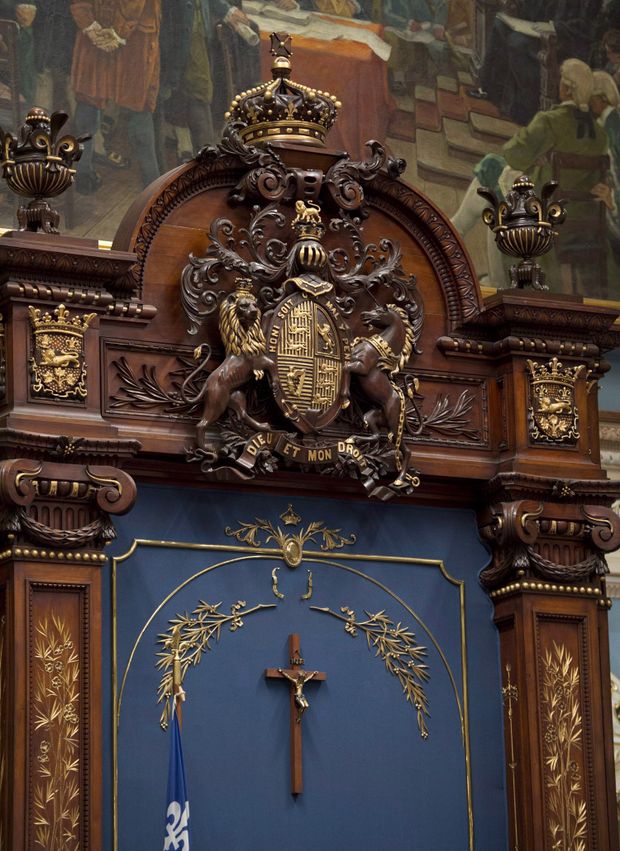The incoming Coalition Avenir Québec government in Quebec said this week it will not remove the crucifix that hangs in the province’s legislature, even as it intends to move ahead with its controversial plan to ban some public servants from wearing religious symbols at work.
The crucifix, a spokesman argued, is nothing but a “heritage object” that is “part of our history” and, as such, it should not be included in the larger argument about religious symbols in the public sphere.
It would be difficult to hold a more hypocritical position than that. The image of Jesus Christ on the cross is one of the most potent religious symbols in the world. Furthermore, its existence in the National Assembly "suggests that a very special closeness exists between legislative power and the religion of the majority,” as the Bouchard-Taylor commission on reasonable accommodation said 10 years ago.
It is simply too convenient to dismiss the crucifix as a mere artifact of Quebec’s past, with no more significance than an old wooden snowshoe hanging on the wall of a ski chalet, while simultaneously arguing that personal displays of religious faith represent a menace to secularism. Consistency would require the CAQ to take down the crucifix tomorrow, a move many francophones support.
But in Quebec’s complicated identity politics, the only thing parties dedicated to secularism have consistently done is defend the presence of the crucifix while vowing to curtail the expression of the small minority of its public employees whose most notable trait, other than their desire to wear religiously symbolic clothing items, is that they aren’t Christians.
The CAQ, picking up where the Parti Québécois’s odious Charter of Quebec Values left off, won the election with a platform that included a promise to prohibit public employees in a position of authority – teachers, judges, prosecutors and police officers – from wearing the Jewish kippah, the Muslim hijab or the Sikh turban on the job. The Christian cross is also to be banned, although it is hard not to suspect that it is a victim of collateral damage, given that it was never targeted before hijabs and turbans became an issue.
Faced with public outrage since the election, the CAQ has backed off somewhat. Party officials now say existing government employees might be allowed to continue wearing religious symbols, but new employees will have to abide by the imminent prohibition. Premier-designate François Legault has even said that his government will use the notwithstanding clause to push the law through.
This is all such self-defeating madness. What the new Quebec government ought to do is allow public servants to wear whatever religious symbols they choose to, a right the Canadian Constitution clearly protects. And, frankly, as strange as it may seem, it should keep the crucifix in the National Assembly.
It would be hypocritical in its own way for us to argue that a hijab covering a teacher’s head, or a small cross pinned to her lapel, is not evidence that Quebec’s secular constitutional democracy has been contaminated by religion, while also insisting the fact that Quebec legislators work in the shadow of a crucifix can only be interpreted in the most negative possible light.
We can, with minimal discomfort, accept the argument that the crucifix is a symbol of Quebec’s past and not a menacing pronouncement of a continuing fealty to Roman Catholic dogma by its lawmakers.
But we can only do so if Quebec politicians show the same rational generosity of spirit to the immigrants and multigenerational citizens who want their religious symbols to be allowed to exist in the background of their daily lives, too.
As long as its remains politically profitable in Quebec to threaten to strip non-Christians of their right to express their religious beliefs as they see fit, then the crucifix in the National Assembly will necessarily continue to carry an ominous significance that belies claims it is simply a relevant historic artifact.
Quebec politicians spend far too much energy on divisive identity politics. It would be wonderful, not to mention rewarding, if they expended that energy on developing policies to better integrate newcomers, whom the province badly needs in order to grow, into the dominant French culture.
Teach them French, help them find jobs, treat them with respect, and immigrants won’t define themselves by their faith. They will call themselves Québécois.




























